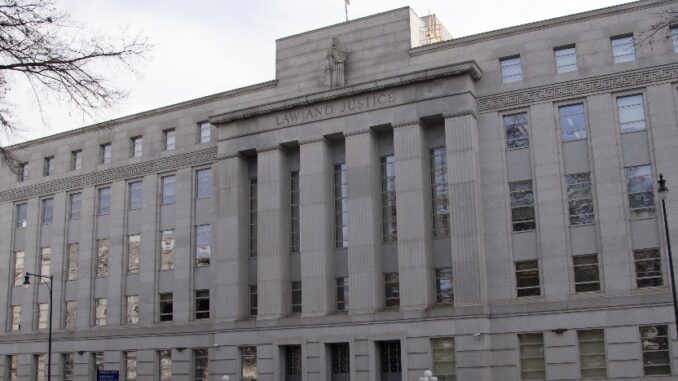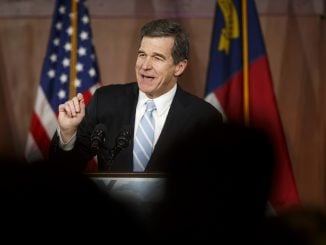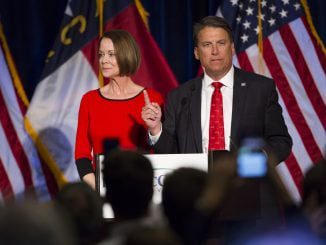
RALEIGH — The race for North Carolina’s Supreme Court seat between Associate Justice Allison Riggs, a Democrat, and Court of Appeals Judge Jefferson Griffin, a Republican, remains unsettled.
On election night, unofficial results put Griffin ahead by more than 10,000 votes. After a machine recount, Riggs leads Griffin by just 742 votes. A partial hand-eye recount has been requested by Griffin, and counties will begin that work Thursday, according to the North Carolina State Board of Elections (NCSBE).
Griffin, who has filed around 300 protests with the NCSBE, has also filed a motion to expedite the protest process.
Protests filed by Griffin include 60,000 ballots his representation claims could have been cast illegally or improperly by deceased voters, felons whose rights are not restored, and ballots cast by individuals with incomplete or invalid voter registrations. Grounds for challenges are laid out in detail by the NCSBE.
When it comes to deceased voters, N.C. law requires an individual to be alive on Election Day for their vote to count. Several counties have allegedly allowed ballots cast by deceased individuals to be counted.
An example of one of the protests filed by the Griffin campaign is documentation of a felon in Wake County who cast a ballot that was accepted during early voting but then reported to jail on Election Day.
For felons, state law says that a convicted felon cannot vote unless their citizenship rights have been restored. Protests filed in multiple counties are challenging votes cast by felons that were accepted by county boards of election.
Additionally, Griffin has filed a motion for the removal of NCSBE Board Member Siobhan Millen from the process due to conflict of interest as she is married to Riggs’ attorney, Pressley Millen.
Both the motion to expedite and motion for removal will be taken up by the NCSBE sometime next week. Some of the protests filed will be handled by the NCSBE, while others taken up by county election boards. Riggs is expected to file their brief on the protests on or before Dec. 6.
Over the past week, Riggs has been vocal in opposition to the protest filings and has issued emails to supporters about the status of the race. She has characterized the ballot challenges as “reckless,” “denying the will of the voters” and, most recently, as “not normal.”
“I continue to be dismayed that my opponent is challenging the ballots of over 60K lawful NC voters,” Riggs wrote in a Dec. 13 thread on X. “Mass challenging the legitimacy of tens of thousands of NC voters is not normal. If you are affected, I hope you’ll share your story publicly. #countdontcancel.”
Tuesday night, Riggs sent out another email to her supporters, urging them to “connect with allies at Progress Action NC” to tell their ballot challenge stories.
Progress Action NC (PANC) is a left-leaning activism and lobbying group established in 2011. The group is registered as a 501(c)4 and is one of dozens of partners of Blueprint NC, an organization that is known for having issued a memo to its partner groups to “cripple, slam, and eviscerate” elected Republican officials, in particular former Republican Gov. Pat McCrory.
The PANC website Riggs links to in her email tells visitors that the ballot challenges are “an attempt to disenfranchise voters and overturn the results of this election.”
“These voter challenges are extremely unusual and erroneous, and all North Carolinians — no matter their political affiliation — should be dismayed by the use of voter intimidation. If your vote is challenged, we encourage you to share your story,” the PANC website states.
The protests filed in this year’s Supreme Court race are not unique. The same thing happened during the 2020 race between then-Supreme Court Chief Justice Cheri Beasley and current Chief Justice Paul Newby.
Beasley, a Democrat, filed 89 protests spanning almost every county in which she alleged that thousands of votes rejected by county boards should have been counted. However, a closer look at the more than 3,200 ballots Beasley sought to include were almost exclusively Democrat and unaffiliated voters.
Newby was unofficially the winner and led Beasley by 406 votes out of close to 5.4 million cast. Following machine and hand-eye recounts, Beasley conceded as Newby emerged as the winner by a margin of 401 votes.
A number of the challenges and protests filed by Griffin are already subjects of lawsuits filed by the North Carolina Republican Party (NCGOP) prior to Election Day. Those legal challenges include missing or incomplete voter registrations, Federal Post Card Applications (FPCA), Uniformed and Overseas Citizens Absentee Voting Act (UOCAVA), deceased voters, felon voters and removed/denied voter registrations.
The NCGOP and Republican National Committee (RNC) filed two lawsuits in August, one of which alleged the NCSBE was in violation of federal and state law by accepting more than 225,000 voter registration forms that did not collect required identification information (driver’s license number or last four digits of Social Security number) as mandated by the Help America Vote Act (HAVA).
Per that lawsuit, the NCSBE admitted to using noncompliant voter registration forms, but the plaintiffs said the NCSBE had refused to take corrective action to identify and remove those voters from the rolls. The following month, the NCSBE said it had removed close to 750,000 ineligible voters from the state’s voter rolls.
“I can’t stress this enough: The guidance, and or lack of guidance, provided by the state board has really provided greater confusion by a lot of these counties, and then they hide behind the guidance that is being provided,” NCGOP Chairman Jason Simmons told North State Journal about felon voter and other removal requests such as provisional ballots. “What we’re continuing to see is really a failure by the state board to ensure consistency, as well as following what the law and statute say regarding the administration of the elections.”
The RNC and NCGOP also filed a lawsuit against the NCSBE over the Federal Post Card Application (FPCA). That lawsuit alleges the NCSBE allowed voters to use their parents’ last known address in North Carolina to vote in the state’s elections without verifying the voter actually lives there.
N.C. law now requires photo ID in order to vote. Challenges filed by the RNC and NCGOP in the area of the Uniformed and Overseas Citizens Absentee Voting Act (UOCAVA) allege certain county boards of election have not required UOCAVA voters to provide a photo ID to vote in state races.
When asked about the Riggs campaign’s efforts to label Griffin’s protest filings as “not normal,” Simmons said Riggs and the Democrats “want an outcome, even if it means counting votes that are known to be rejected and not being added to the count.”
Simmons added, “No matter what the outcome is, it’s wrong to count ballots that should not be counted because they’re not allowed.”
Should Riggs prevail and retain her seat, she is still facing a pending ethics complaint lodged against her over campaign ads in which she appears to take a position on the issue of abortion, a possible violation of the Code of Judicial Conduct.



